Key takeaways:
- Understanding homelessness involves recognizing the complex interplay of personal circumstances, systemic failures, and societal stigma.
- Advocacy elevates the voices of homeless individuals, pushing for policy reform and community support while fostering empathy and solidarity.
- Charities play a vital role in advocacy, bridging the gap between affected individuals and policymakers, and facilitating self-advocacy efforts.
- Personal interactions with homeless individuals reveal the emotional toll of their experiences, emphasizing the need for compassion and support in advocacy work.
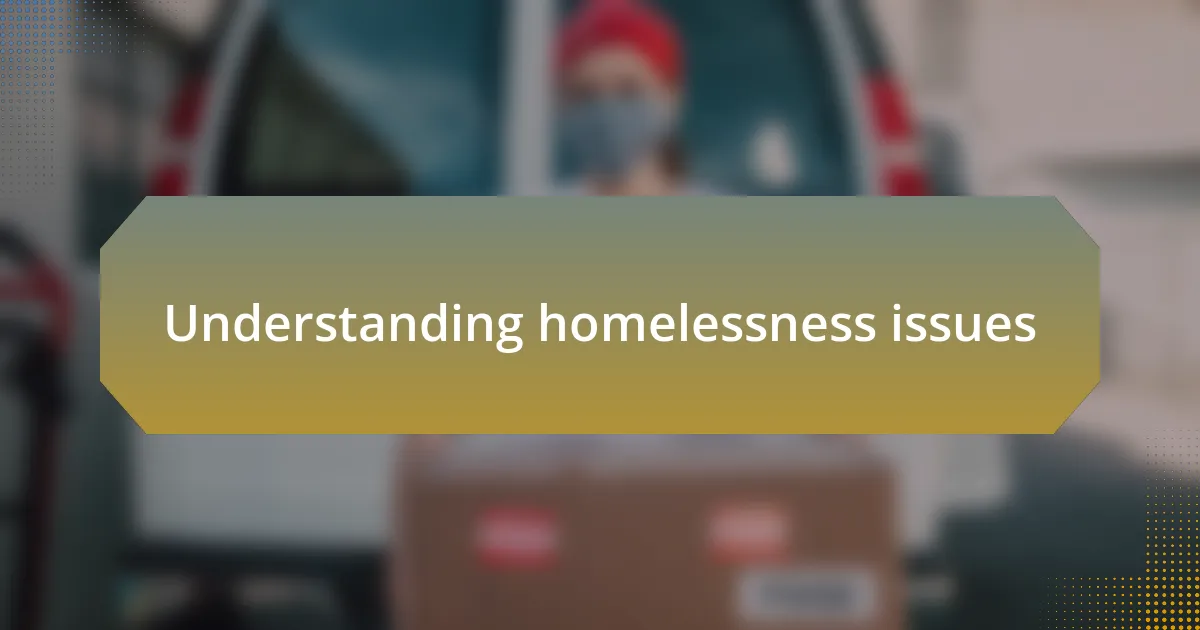
Understanding homelessness issues
Understanding homelessness issues requires us to look beyond the surface. A few years ago, I volunteered at a local shelter and met a man named David, who had lost his job and subsequently his home. Listening to his story made me realize how easily life can take unexpected turns, leaving anyone vulnerable to homelessness.
I often ponder: what helps to create such a stark divide between us and those experiencing homelessness? It’s often a web of circumstances, including mental health challenges, systemic failures, and economic instability. I vividly recall a woman at the shelter who was not just seeking a meal but a kind word—her eyes mirrored the struggles countless others face every day, often overlooked.
In exploring homelessness, we must confront uncomfortable truths about society. I’ve witnessed firsthand that many believe homelessness is a choice, but it’s crucial to understand the underlying factors, such as addiction and lack of affordable housing. Reflecting on these issues leads me to ask: how can we create a system that truly supports individuals rather than stigmatizes them? Each story adds a layer to our understanding of this complex issue, urging us to empathize and advocate for change.
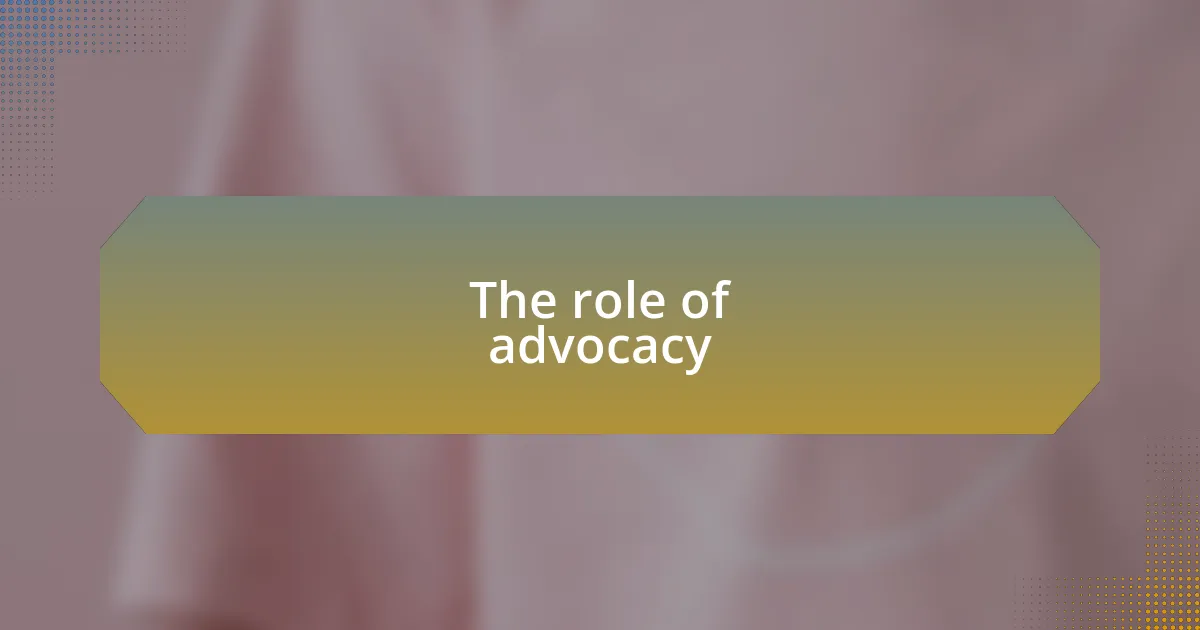
The role of advocacy
Advocacy plays a critical role in elevating the voices of those affected by homelessness. I recall a time when I attended a town hall meeting where individuals experiencing homelessness shared their stories. It was incredibly powerful to see how advocacy brought their struggles to the forefront, fostering understanding and compassion within the community. Hearing them speak made me wonder: how often do we miss the chance to listen to those who are most impacted by the policies that govern their lives?
Moreover, advocacy is not just about raising awareness; it’s about pushing for tangible change. I remember working on a campaign to influence local government decisions regarding affordable housing. Together with passionate advocates, we highlighted how policy reform could improve access to stable housing for vulnerable populations. I couldn’t help but be inspired by the sheer determination of my fellow advocates, but it also begged the question: what drives us to keep fighting when the systems seem so entrenched?
The emotional impact of advocacy is profound. When I supported a friend in sharing his journey from homelessness to stability at a community event, I saw firsthand how advocacy can empower individuals. His courage to speak out not only inspired others but also created a ripple effect, encouraging more people to join the fight for social justice. This experience reminded me that advocacy is not just about policy—it’s about fostering a sense of community and solidarity. How can we cultivate that spirit in our work to ensure no one feels alone in their struggle?
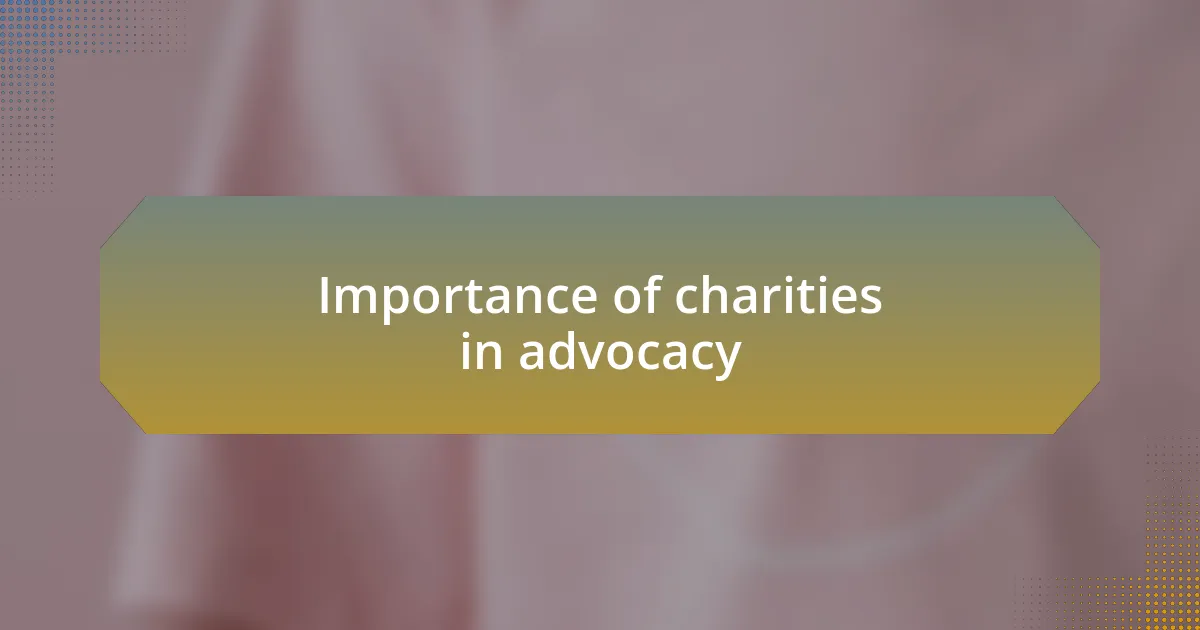
Importance of charities in advocacy
Charities hold a unique position in advocacy, acting as both a voice and a resource for marginalized communities. I recall volunteering at a shelter where we organized a series of workshops aimed at empowering individuals experiencing homelessness. This experience opened my eyes to how charities not only provide immediate relief but also foster empowerment by equipping people with the tools they need to advocate for themselves. Isn’t it fascinating how a simple act of giving can ignite a spark of self-advocacy in someone?
The partnership between charities and advocacy efforts drives awareness and mobilizes resources for systemic change. I once participated in a charity gala where funds were raised specifically to support legal assistance for those facing eviction. Seeing the community rally around this cause reminded me of the power of collective action. It makes me wonder: how can we harness that same energy to address the root causes of homelessness?
Moreover, charities often serve as a bridge between affected individuals and decision-makers. I remember an advocacy training session I attended with a nonprofit organization, where survivors of homelessness learned how to share their stories with policymakers. It struck me how vital this connection is; it empowers people to articulate their needs while also urging policymakers to listen. If charities weren’t there to facilitate these discussions, would vulnerable voices go unheard? This highlights the essential role charities play in not just supporting individuals but also shaping more equitable policies.
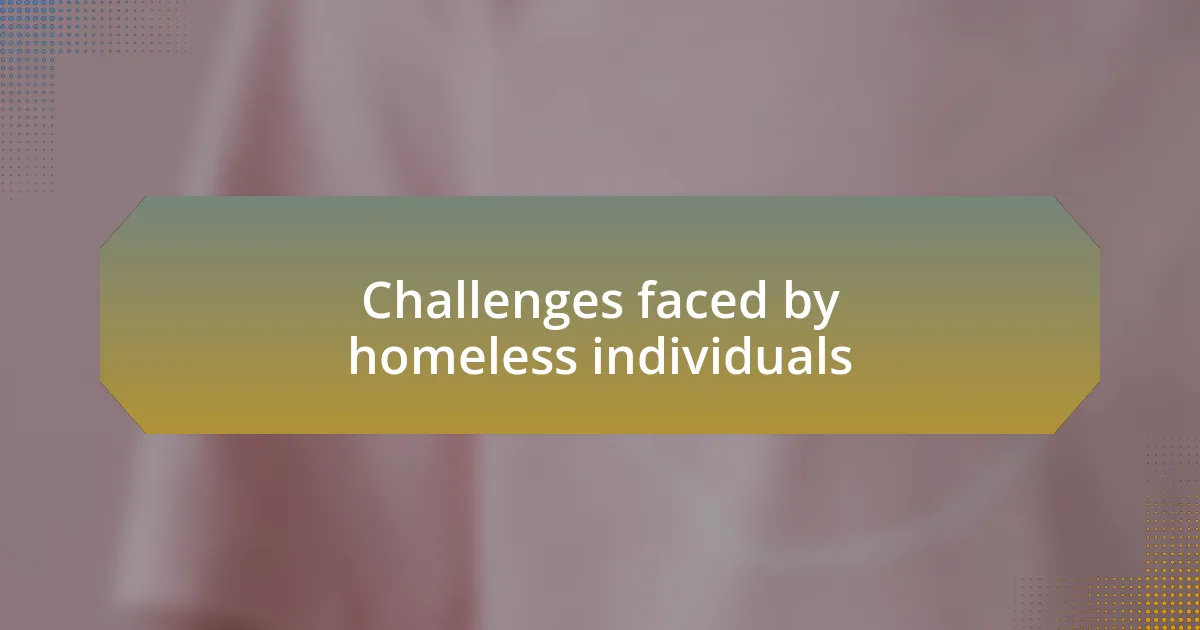
Challenges faced by homeless individuals
Homeless individuals face a multitude of challenges that often go unnoticed. For instance, when I spoke with someone living on the streets, they shared how constant anxiety about personal safety can be overwhelming. Imagine trying to sleep when you feel vulnerable at every corner; it was a stark reminder of how basic needs like safety can become elusive.
Access to healthcare poses another significant hurdle. During a community outreach event, I met a man who had put off seeking medical attention for months due to financial constraints and lack of transportation. This conversation highlighted how health issues can compound the struggles faced by those experiencing homelessness. It makes me wonder: what would happen if everyone had guaranteed access to at least basic healthcare?
Moreover, the stigma associated with homelessness can create barriers to reintegration into society. I’ve seen many individuals feel judged for their situation, which can erode their self-esteem and motivation. This emotional toll often prevents people from pursuing jobs or stable housing, leaving them trapped in a seemingly unbreakable cycle. It’s heartbreaking to realize that societal perceptions can be just as damaging as the lack of resources.
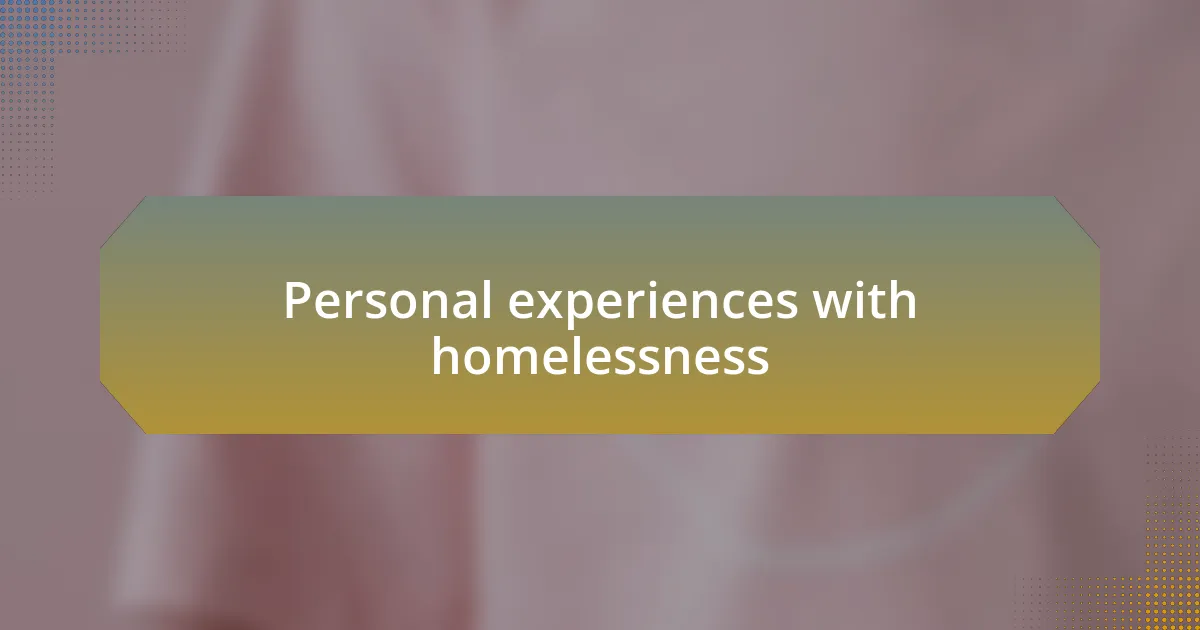
Personal experiences with homelessness
When I volunteered at a local shelter, I met a young woman who described how quickly life can unravel. She shared that one job loss led to eviction, and just like that, she found herself with nowhere to go. It made me reflect on how fragile our stability can be, and I often think about how quickly anyone could end up in a similar situation, regardless of their background.
I’ve also witnessed firsthand the emotional toll that homelessness takes. One evening, I spoke with a man who, despite his circumstances, managed to maintain a sense of humor. Yet, as he opened up, I could see the layers of pain beneath his bravado. “You can laugh or cry,” he said, “but at the end of the day, you’ve got to keep moving.” His resilience inspired me, yet I couldn’t help but wonder: how many people bury their struggles behind a smile?
Reflecting on these experiences, I realize that personal stories fuel my passion for advocacy. The moments of connection with individuals experiencing homelessness have taught me that their stories are not just statistics; they are rich, complex lives filled with aspirations and hardships. How can we not feel compelled to act when we hear these narratives?
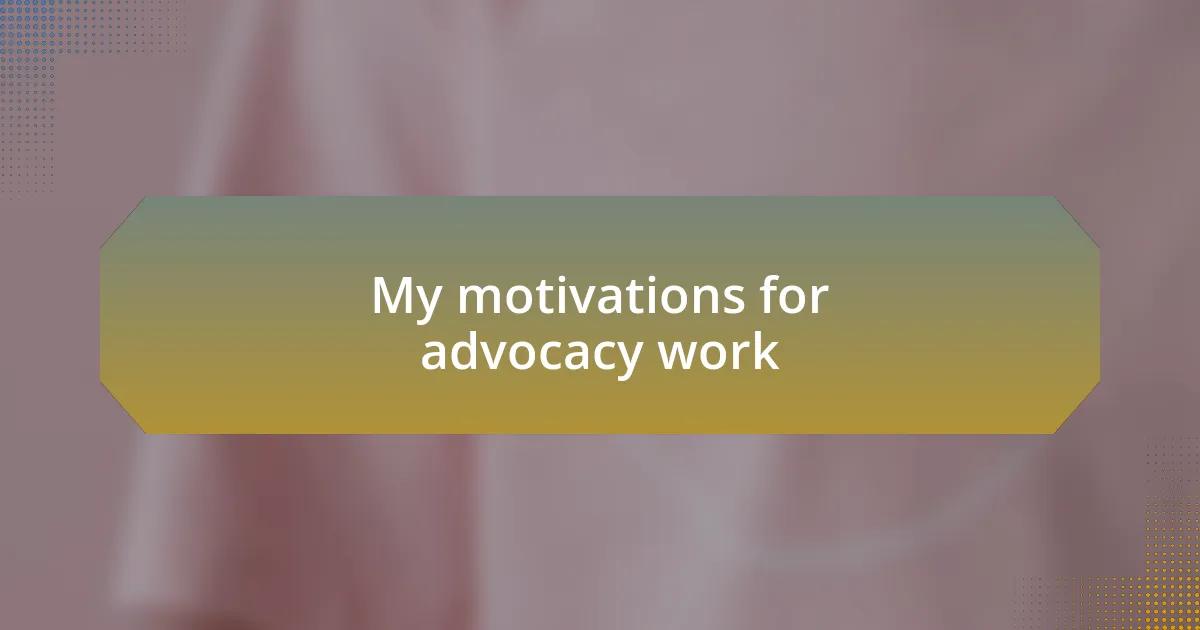
My motivations for advocacy work
When I think about my motivations for advocacy work, I can’t help but recall the man I met who had once been a college professor. He had fallen on hard times after a series of unfortunate events—unexpected health issues, the loss of his home, and ultimately, his dignity. Hearing him speak about his love for teaching and how he felt invisible in society was a powerful reminder for me: what if the same fate could befall someone I know? That thought sparks a relentless drive in me to bring visibility to these stories.
I’ve also found motivation in the conversations I’ve had with families affected by homelessness. During one outreach event, a mother shared how she juggles finding work with caring for her kids, who often need stability more than anything. Her determination left a lasting impression on me. It made me realize that advocacy isn’t just about addressing homelessness; it’s about creating a supportive community where families can thrive. How can we stand by when the future of our communities is at stake?
Ultimately, my passion for advocacy is deeply rooted in the belief that everyone deserves a fair chance, regardless of their circumstances. In every face I see, I am reminded that compassion can drive real change. Aren’t we all just one twist of fate away from needing help ourselves? This resonates deeply with me, and it propels me to strive for a world where no one is left behind.